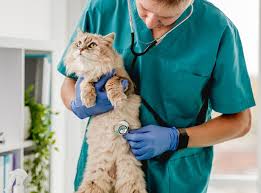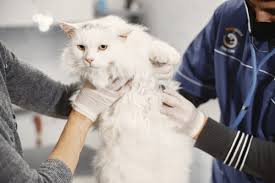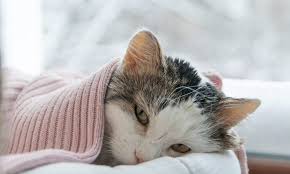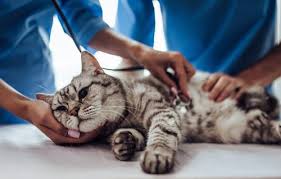I will highlight a couple of diseases that should be on every cat owner’s radar. Panleukopenia, also known as feline distemper, is a highly contagious viral disease and can be quite severe. Then there’s feline leukemia, a disease that weakens a cat’s immune system and is one of the most common causes of death in cats, mainly because it makes them susceptible to other infections.
But wait, there’s more you need to watch out for – intestinal parasites and skin infections can affect cats of all stripes. These nuisances aren’t just discomforting; they can lead to more serious health problems if not addressed.
Let’s also talk about the creepy crawlies like roundworms and tapeworms. They’re not just gross; they’re harmful to your cat’s health. Tick borne diseases should also be on your list of concerns, especially if your cat enjoys the great outdoors.
I’m here to help you understand these diseases, but remember, it’s always best to seek advice from a professional vet for diagnosis and treatment. Up next, I’ll walk you through how preventative care plays a critical role in keeping these ailments at bay.
The Importance of Preventive Care for Cats
I’m going to guide you through why preventive care is an absolute must for your feline companion. Regular wellness exams are often the first line of defense against health issues for cats. Management is better than cure, especially for cats who aren’t the best at communicating when something’s not right.
So what does a wellness exam entail? Imagine a thorough head-to-tail check-up. This is where your vet will examine all major body systems – from bright eyes and alert ears to their energetic heart and lungs. Don’t forget about checking for infections, unusual growths, pesky parasites, and the all-important dental health. It’s a lot, but it’s important.
And what about blood tests? They’re a window into your cat’s internal health and can be crucial, especially with age. Think of it as an internal report card, showing us how those organs are doing underneath their cute exterior.
Your vet’s findings from a wellness exam can say a lot. Not only do they let us know if everything’s in tip-top shape, but they can also highlight areas that might need a bit more attention. It’s about giving you, the pet owner, clarity on your cat’s health and peace of mind.
Navigating Vaccinations and Treatments
Now, as we dig into the world of vaccinations and treatments, you’re going to find out about how these measures are your cat’s first line of defense. I’m here to help you understand the vaccines your furry companion may need to stay in tip-top shape.
 During the wellness exam, your vet won’t just give any vaccines willy-nilly. It’s a tailored process, specific to your cat’s lifestyle and risks. I’ll go over a list of standard vaccinations for feline health and explain why they’re recommended.
During the wellness exam, your vet won’t just give any vaccines willy-nilly. It’s a tailored process, specific to your cat’s lifestyle and risks. I’ll go over a list of standard vaccinations for feline health and explain why they’re recommended.
After your vet completes the exam, they’re going to discuss their findings with you. This isn’t just about shots; it’s also about creating a comprehensive health plan. Whether it’s dietary advice or scheduling routine treatments, your vet has got you covered.
Sometimes, cats need surgeries, like spaying or neutering. If this is the case, don’t worry too much about it. Your vet is well-equipped with an anesthesia protocol and tools to monitor vital signs, ensuring your cat’s safety and comfort.
In my opinion, staying informed about your cat’s health needs is crucial. Remember, choosing something that resonates with you and your pet’s lifestyle is key. You can always adjust your approach down the way, but it’s important to start with a solid foundation of vaccinations and care.
The Role of Annual Exams in Feline Wellness
Regular check-ups are non-negotiable for responsible pet ownership. Waiting for obvious signs of illness can often mean missing the early stages when treatment is most effective. I’m here to tell you why annual exams for your furry pal aren’t just a formality—they’re a proactive approach to feline healthcare.
An annual exam is like a detailed report card on your cat’s health. This visit is your chance to catch health issues before they become serious problems. Your vet will search for the subtle signs of illness you’re likely to miss at home. From dental health to the tip of the tail, everything is assessed for any changes that need attention.
Vaccinations play a crucial role during these exams. They’re not just a bureaucratic requirement but a valuable defense against common, and sometimes fatal, diseases. Annual vaccines can be the difference between a minor illness and a life-threatening situation. Every year, your vet will evaluate which vaccines are needed based on your cat’s lifestyle and risk exposure.
Remember, the goal is to ensure your buddy lives not just a long life, but one of quality. I invite you to see your vet as a partner in your cat’s health. Together you’ll craft a long-term health strategy that can evolve as your cat ages. Nurturing this partnership means your cat benefits from continuity in care and personalized attention through every stage of life.
You now have the information you need to keep your cat in top shape. Healthy cats are typically happy cats, and happy cats make for happy homes. So, take the step to schedule that annual exam—it’s a decision that you, and your kitty, will be grateful for in the long run.


 eases – some more serious than others.
eases – some more serious than others.